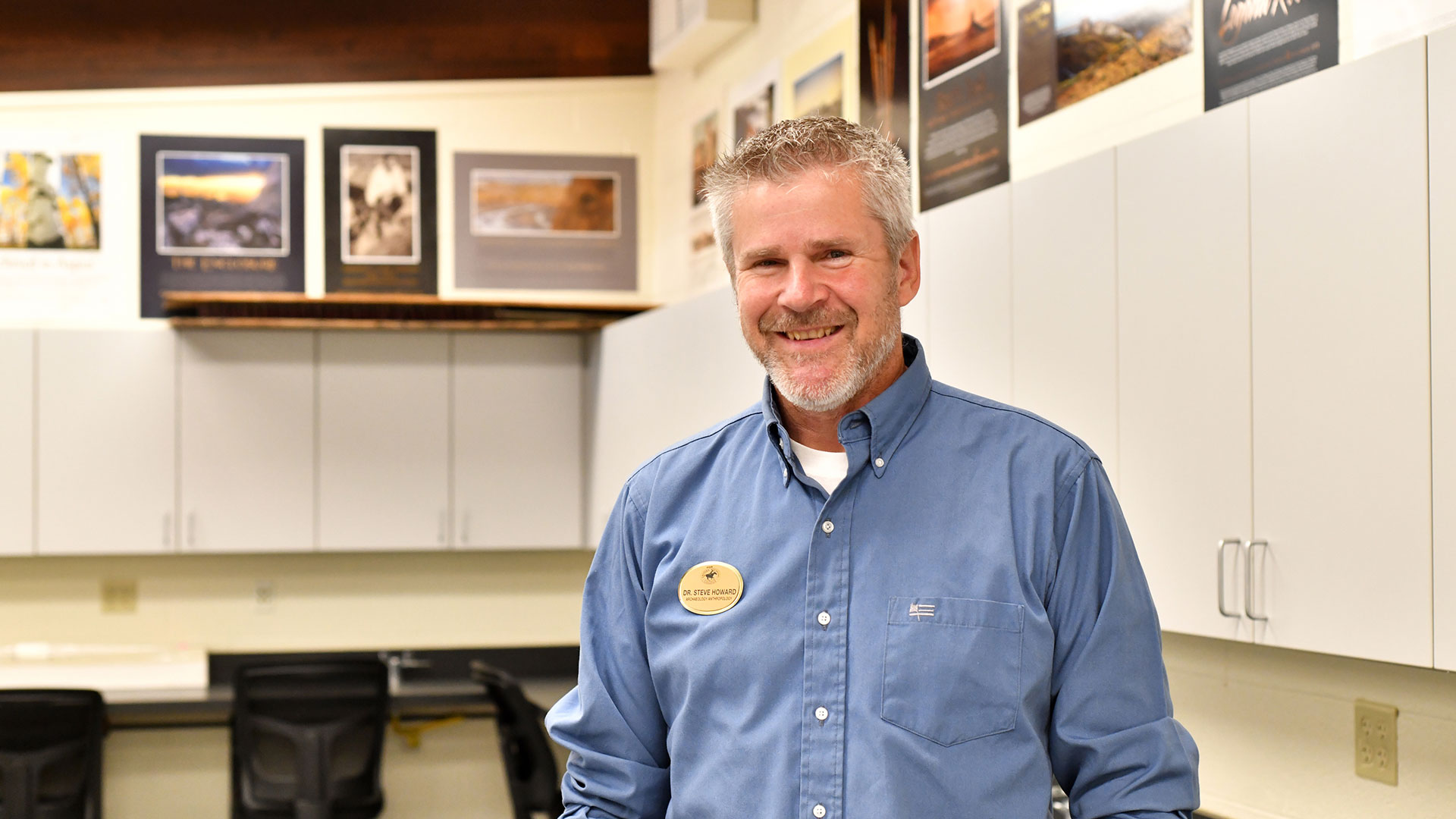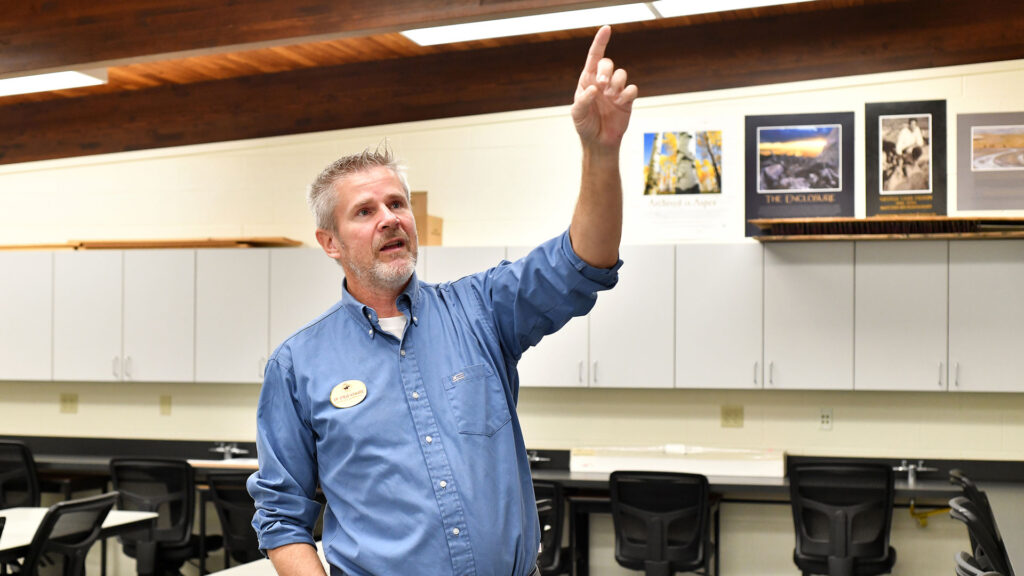Howard Brings Archaeology and Anthropology to EWC

Steve Howard has enjoyed science since elementary school. At 14-years-old he helped on an archaeology dig site, and he was hooked.
“I found some pottery and thought, ‘this is cool,’ Howard said. “I wanted to be an archaeologist.”
However, in high school everyone discouraged him saying there were no jobs in archaeology, and he should travel a different career path.
After graduating high school, he was working for a lady doing gardening. When he told her what his dream would be, she encouraged him to go after his dream, and he did.
He enrolled in the State University of New York at Geneseo and received his bachelor’s degree. After graduating from Geneseo he went to Ohio State University and earned his master’s degree.
Two years into his studies at Ohio State he was asked to teach a class, which at first, Howard wasn’t very excited about.
“I’m originally a shy person” and the thought of speaking in front of a class was not attractive. But they offered to provide tuition and a stipend. That was the selling point and he agreed to teach and “I really enjoyed teaching.”
After graduating he went into the PhD program, finishing in 2010. By that time he found himself in Texas working on the Gault Site.
The site contains strata dating back to more than 13,500 years B.C. and prior to the appearance of Clovis. The Gault Site is in Florence, Texas on the Williamson-Bell County line along the Buttermilk Creek.
“We were finding stuff earlier than Clovis,” Howard said. Clovis was believed to have been the earliest humans in the western hemisphere dating back roughly 11,500 years B.C. near the end of the Last Glacial Period.
At the Gault Site Howard worked with local ranchers and other public officials on how to preserve artifacts they may find. He also worked with archeology tourists, and other archeologists from around the world who came to dig to confirm for themselves the ‘Older than Clovis’ deposits.
While working at the site Howard took an adjunct professor position at Austin Community College. He taught at ACC for 12-13 years.
“I enjoyed the teaching,” Howard said. “I developed a study abroad program and took students to England to study early Roman culture.”
Then, “out of the blue I got a call asking if I’d be interested in teaching at Eastern Wyoming College (EWC) in Torrington, Wyoming,” he said. “My first thought, ‘Where is Torrington, Wyoming?’”
EWC received funds to develop an education-based tourism program, according to EWC Vice-president of Student and Academic Services John Hansen. Working with the Sunrise Historic and Prehistoric Preservation Society (SHAPPS) the college plans to develop an integrated approach that looks at identifying key assets in our area, developing partnerships to maximize their reach, and then producing a program and training that will draw tourism from around the world.

Steve Howard, the new professor of Archaeology and Anthropology, explains changes he is making to a classroom at Eastern Wyoming College to make it a lab. He will work to develop a degree and certificate program in Archaeology and Anthropology at EWC.
“Dr. Howard rose above the rest (of the candidates) because of his extensive experience running field schools and his background of working with students at a community college,” Hansen said. “Moreover, his experience in working on dig sites around the world was also a key factor. One of his most unique qualities is that he is interested in sharing his passion of anthropology and archeology with students of all age ranges.”
After finding Torrington on the map, Howard came for a visit.
“Everyone was very enthusiastic about bringing a tourism program to EWC and working with SHAPPS at Sunrise (Wyoming),” Howard said. “It was very intriguing.”
Some of the work with SHAPPS at the Sunrise Mine is on the Powars II Paleoindian Archaeological Site. The site is thought to be the oldest know mining operation in both North and South America. The ochre mine dates back over 13,000 years.
Ochre is a powdery mineral used by some Native American tribes as a pigment for a variety of ritual purposes. Ochre comes in a variety of different colors. At the site at Sunrise, the natural color of the ochre is red.
“I thought, ‘I can yank myself out of Austin and come up here,” he said. “It also doesn’t hurt to have mountains so close.”
At EWC Howard’s official title is Professor of Archaeology and Anthropology. He will work to develop a degree and certificate program.
“Dr. Steven Howard is a perfect fit for the needs of the college, community and archaeology/anthropology,” executive director of SHAPPS Geri Zeimens said. “There has been a need of another fully trained archaeologist in the area for quite some time. The area that we live is so rich in historic and prehistoric sites. Many of these sites are eroding in the North Platte Valley area.”
His work in a community college setting, an agricultural community and his work on archaeological sites similar to the site at the “historic and prehistoric town of Sunrise,” makes Howard a great fit, according to Zeimens.
Starting in the Spring semester of 2024 Howard will teach Biological Anthropology (ANTH 1100), the study of the physical or biological aspects of humans. It is a four-credit class that counts as a Lab Science. He will also teach Cultural Anthropology (ANTH 1200), the study of human societies and cultures through time and across the world. The three-credit course counts as a Social and Behavioral Science class. The third course will be in Archaeology (ANTH 1300), the study of human societies, cultures, and behavior in the past, through analysis of the material remains they’ve left behind. This course counts as a Social and Behavioral Science at EWC and transfers as a Natural Science at the University of Wyoming.
This summer Howard will offer an Archaeology Field School (ANTH 2460) at the Sunrise Mine. The field school will cover field and basic laboratory methods in archaeology for data collection, analysis, and interpretation of cultural material.
“Concurrent with the Archaeological Field School in the summer, we have a number of public archaeology programs planned,” Howard said. “These include Archaeology Days, in which school or civic groups can participate in workshops, tours, activities, and even excavations at Sunrise Mine.”
Howard is also planning to host an International Volunteer Work Program. It is a program that works through Volunteers for Peace and brings people together from around the world to work on different projects.
“I’ve been involved with the International Volunteer Work Program since 2015 in New York,” Howard said. “It is a great opportunity for local people to meet people from all over the world.”
Since arriving at EWC Howard has been traveling the state talking with students, historical societies, and others about the new program being offered at EWC and the school’s partnership with SHAPPS at Sunrise Mine.
“The partnership with SHAPPS is wonderful; they are a connected group that believes in education, preservation, and sharing the historic assets of the area,” Hansen said. “The whole partnership under the Wyoming Innovation Partnership (WIP) works because of John Voight, (Land Owner) of Sunrise mine. John’s belief in preservation and willingness to share and invite the College to partnership in this historic task is unmatched.”
The new Archaeology and Anthropology programs at EWC and the partnership with SHAPPS will give students an opportunity to gain hands on experience in uncovering the history of Eastern Wyoming.
